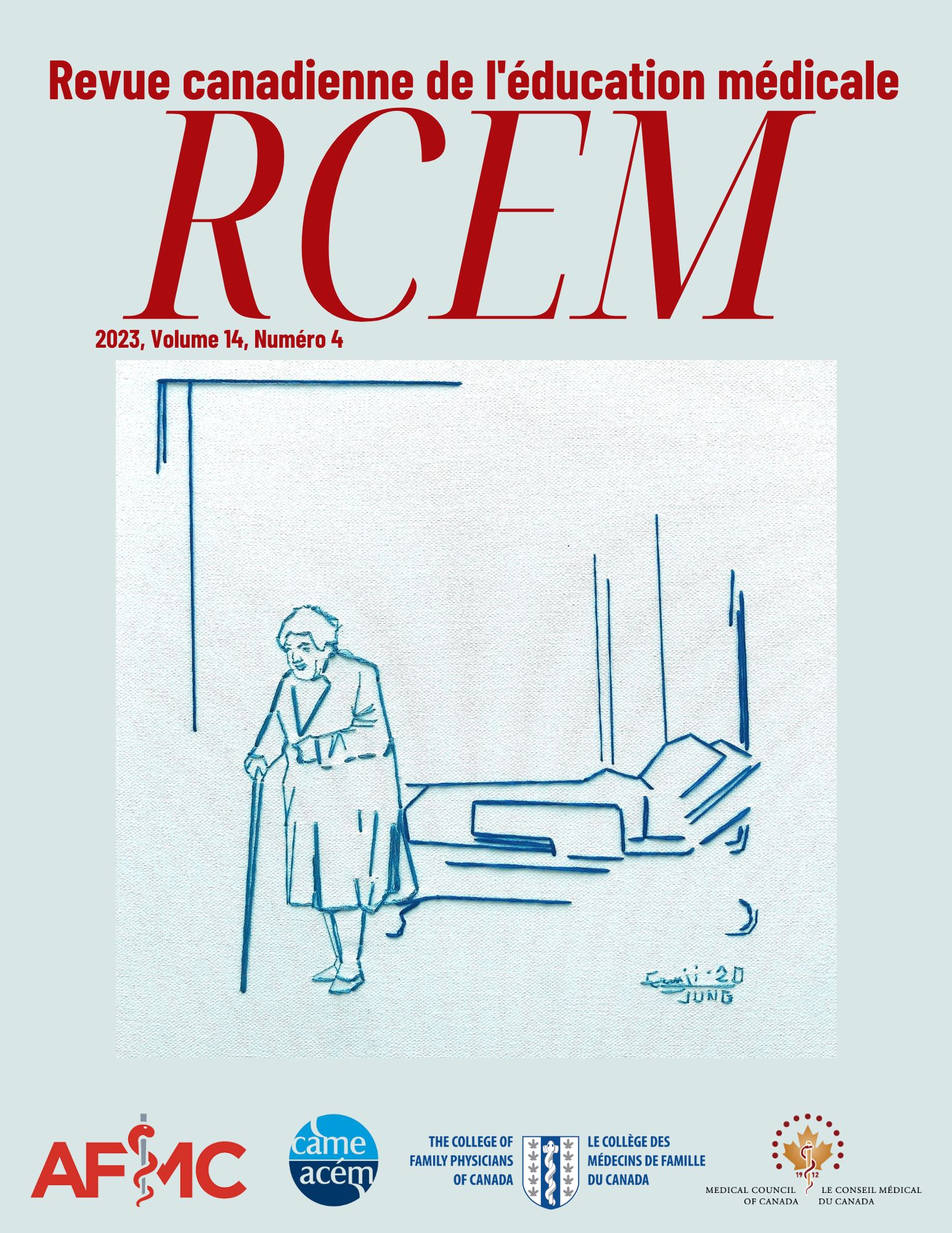Des stratégies d’étude pratiques et personnalisables pour réussir son année d’externat
DOI :
https://doi.org/10.36834/cmej.75072Résumé
Le passage du programme de préexternat à l’année d’externat exige que les étudiants revoient leurs stratégies d’étude pour les examens cliniques et pour l’examen STEP 2 Clinical Knowledge du United States Medical License Examination. Un apprentissage efficace et efficient est essentiel pour trouver un équilibre entre l’importante augmentation des responsabilités de soins aux patients et la diminution du temps consacré à la préparation des examens.
Nous proposons aux étudiants en médecine plusieurs approches d’étude personnalisables, ainsi que des conseils sur la sélection de ressources et méthodes pour appliquer le modèle éducatif de la pratique délibérée et de la rétroaction corrective à leur apprentissage pendant les années d’externat. Ces stratégies, adaptées à l’année d’externat, sont focalisées sur l’autoévaluation et axée sur les résultats pour repérer et combler les lacunes en matière de connaissances. Elles aideront les apprenants à se sentir en confiance de leurs moyens.
Références
O’Brien B, Cooke M, Irby DM. Perceptions and attributions of third year learner struggles in clerkships: do learners and clerkship directors agree? Acad Med. 2007; 82(10):970-8. https://doi.org10.1097/ACM.0b013e31814a4fd5 DOI: https://doi.org/10.1097/ACM.0b013e31814a4fd5
Prince K, Boshuizen H, van der Vleuten C, Scherpbier A. Students’ opinions about their preparation for clinical practice. Med Educ. 2005; 39(7): 704-12. https://doi.org10.1111/u.1365-2929.2005.02207. DOI: https://doi.org/10.1111/j.1365-2929.2005.02207.x
Surmon L, Bialocerkowski A, Hu W. Perceptions of preparedness for the first medical clerkship: a systematic review and synthesis. BMC Med Educ. 2016; 16:89. https://doi.org10.1186/s12909-016-0615-3. DOI: https://doi.org/10.1186/s12909-016-0615-3
Volk AS, Rhudy AK, Marturano MN, et al. Best study strategy for the NBME clinical science surgery exam. J Surg Educ. 2019; 76(6): 1539-45. https://doi.org10.1016/j.surg.2019.05.012. DOI: https://doi.org/10.1016/j.jsurg.2019.05.012
Eder T, Richter J, Scheiter K, et al. How to support dental students in reading radiographs: effects of a gaze-based compare-and-contrast intervention. Adv Health Sci Educ Theory Pract. 2021; 26(1): 159-81. https://doi.org10.1007/s10459-020-009974-w. DOI: https://doi.org/10.1007/s10459-020-09975-w
Simonian MJ, Brand D. Assessing the efficacy of and preference for positive and corrective feedback. J Appl Behav Anal. 2022 Jun; 55(3): 727-45. https://doi.org10.1002/jaba.911. DOI: https://doi.org/10.1002/jaba.911
Ericsson KA, Krampe RT, Tesch-Romer C. The role of deliberate practice in the acquisition of expert performance. Psychological Review. 1993; 100(3): 363-406. https://doi.org10.1098/rsos.190327. DOI: https://doi.org/10.1037/0033-295X.100.3.363
Ericsson KA. Acquisition and maintenance of medical expertise: a perspective from the expert-performance approach with deliberate practice. Acad Med. 2015; 90(11): 1471-86. https://doi.org10.1097/ACM.0000000000000939. DOI: https://doi.org/10.1097/ACM.0000000000000939
Davila-Cervantes A, Foulds JL, Gomaa NA, et al. Experiences of faculty members giving corrective feedback to medical trainees in a clinical setting. J Contin Educ Health Prof. 2021; 41(1): 24-30. https://doi.org10./1097/CEH DOI: https://doi.org/10.1097/CEH.0000000000000322
Zhao C, Hu Y. Reflections on study strategy modifications using cognitive load theory and dual processing theory in the first year of medical school. Med Sci Educ. 2021; 31: 813-18. https://doi.org10.1007/s40670-020-01198. DOI: https://doi.org/10.1007/s40670-020-01198-3
Borsheim B, Ledford C, Zitelny E, et al. Preparation for the United States medical licensing examinations in the face of COVID-19. Med Sci Educ. 2020; 30(3): 1267-1272. https://doi.org10.1007/s40670-020-01011-1. DOI: https://doi.org/10.1007/s40670-020-01011-1
Garino A. Ready, willing and able: a model to explain successful use of feedback. Adv Health Sci Educ Theory Pract. 2020; 25(2): 337-61. https://link.springer.com/article/10.1007/s10459-019-09924- DOI: https://doi.org/10.1007/s10459-019-09924-2
Le T, Bhushan V, Deol M, et al. First Aid for the USMLE Step 2 CK, Tenth Edition. New York: McGraw-Hill Education; 2018. https://www.mhebooklibrary.com/doi/book/10.1036/9781260440300
Agabegi ED, Agabegi SS. Step-Up to Medicine. 4th ed. Philadelphia: Wolters Kluwer; 2016.
Toy EC, Briscoe D, Britton B, et al. Case files: family medicine. 5th ed. New York: McGraw Hill Education; 2020. https://accessmedicine.mhmedical.com/cases.aspx?groupid=373.
Téléchargements
Publié
Numéro
Rubrique
Licence
© Hannah Johnston, Caroline Zhao, Yenya Hu 2023

Cette œuvre est sous licence Creative Commons Attribution - Pas d'Utilisation Commerciale - Pas de Modification 4.0 International.
La soumission d’un manuscrit original à la revue constitue une indication qu’il s’agit d’un travail original, qu’il n’a jamais été publié et qu’il n’est pas envisagé pour publication dans une autre revue. S’il est accepté, il sera publié en ligne et ne pourra l’être ailleurs sous la même forme, à des fins commerciales, dans quelque langue que ce soit, sans l’accord de l’éditeur.
La publication d’une recherche scientifique a pour but la diffusion de connaissances et, sous un régime sans but lucratif, ne profite financièrement ni à l’éditeur ni à l’auteur.
Les auteurs qui publient dans la Revue canadienne d’éducation médicale acceptent de publier leurs articles sous la licence Creative Commons Paternité - Pas d’utilisation commerciale, Pas de modification 4.0 Canada. Cette licence permet à quiconque de télécharger et de partager l’article à des fins non commerciales, à condition d’en attribuer le crédit aux auteurs. Pour plus de détails sur les droits que les auteurs accordent aux utilisateurs de leur travail, veuillez consulter le résumé de la licence et la licence complète.











